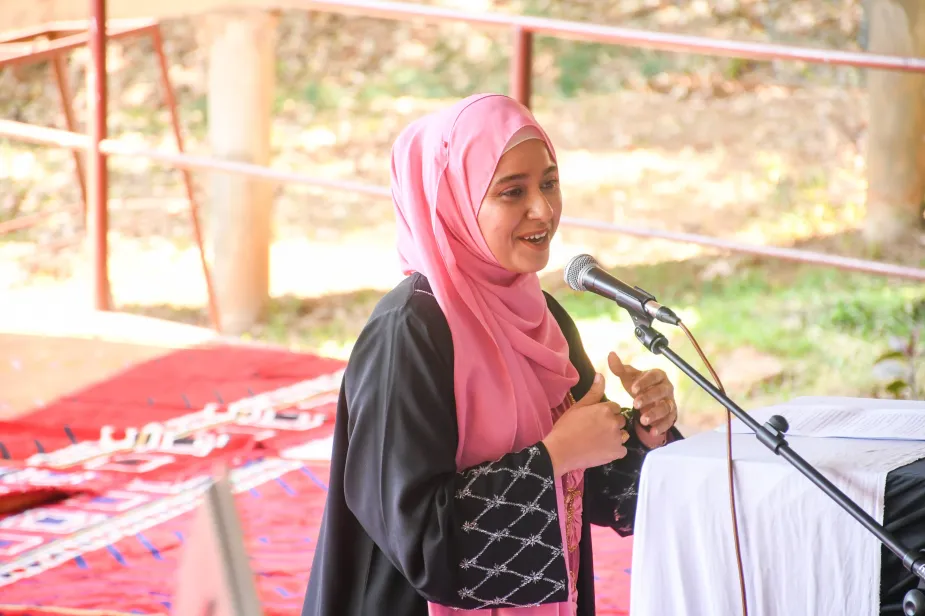Ibtisam Balala’s Mantra: A Roadmap to Success
Monday, August 26th, 2024

Ibtisam Balala is the Talent Manager for East Africa at AGL Kenya Ltd, tasked with overseeing Talent Management for five countries in East Africa. She is also the Human Resources Manager – Mombasa, where she oversees HR functions for over 1000 workers at various companies such as AGL, the Leading Logistics Company in Africa, MCT, a Container Freight Station Company, and two Shipping Agents—SOCOPAO and EACS.
Growing up at a time when mentorship programs were few and almost non-existent, she lauded the efforts of Swahilipot Hub Foundation for creating the case management mentorship project, something the youth of the day should utilize for growth.
Her mantra to success, a product of mentorship from her father, looks quite straightforward on the surface, like something you might encounter on a random social media handle, but it runs deeper than an iceberg. This depth has been further enhanced by her experience in a dynamic workforce and her ability to adapt from traditional HR models to more forward-thinking ones that embrace today’s workforce, making her an invaluable direct and indirect mentor.
Starting off by quoting Nas, one of the greatest rappers alive, Ibtisam made an immediate impact by getting the full-to-capacity amphitheater to chorus Nas’ "I Know I Can." It was a terrific start to the employer's engagement forum that reminded the youth mentees that they hold within themselves the power to be whomever and whatever they desire to be as long as they work hard at it.
What was captivating about her speech as the chief guest was not only how elegant, eloquent, and ethereal she was but how she captured the audience’s attention. She duly noted that a good 90% were attentive and a mere 10% were on their phones. In this, there was a lesson to take home: to stand out, you really must be present and conscious of your immediate environment. You have to speak not from mere conjecture but from hard facts, and you must speak of the path you’ve trodden, for it is on this path that you discover or kill your vision.
Building the life you want, Ibtisam emphasized, starts with two virtues—courage and confidence. Courage is showing up against all odds, while confidence is one’s openness to learn. The two virtues, she explains, shine without the need to speak.
Her Three Mantras to Success:
- Be good: How you interact with others and show empathy.
- Be smart: How you articulate your thoughts and express yourself.
- Be sharp: Be aware of your surroundings and how you impact it.
Mastering the above three mantras will allow you to:
- Be kind: Being genuine and considerate.
- Be productive: Doing what you need or what needs to be done.
- Recognize opportunities: See where you can make a difference.
- Appreciate the value of time.
Beyond this, she laid more emphasis on the power of knowing oneself. Even as youth strive to navigate the workplace, it is vital that they understand their strengths. Reiterating what the Swahilipot Hub Foundation Chief Mentor had cited earlier, she said an employer would prefer someone who, even without showing up at work, delivers on their objectives as opposed to one who is ever present but much less productive. Knowing oneself also allows your employer to easily identify opportunities for growth.
Youth have more often than not blamed their backgrounds for their lack of success. This, Ibtisam noted, should never be a hindrance to one’s success. Anyone we consider an impeccable role model has impressive success stories, and they all begin with small incremental steps done consistently over time, resulting in monumental changes. Success stories do not come from a vacuum but from a place of hard work, dedication, and sacrificing immediate pleasures for delayed gratification.
While summing up her captivating speech, Ibtisam urged youth to be curious about life and about their own selves, to interrogate how far they can go when—and not if—they allow themselves to.
